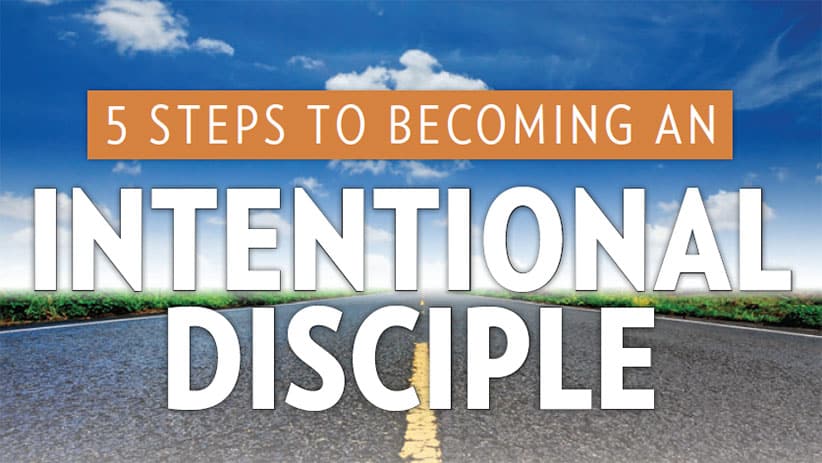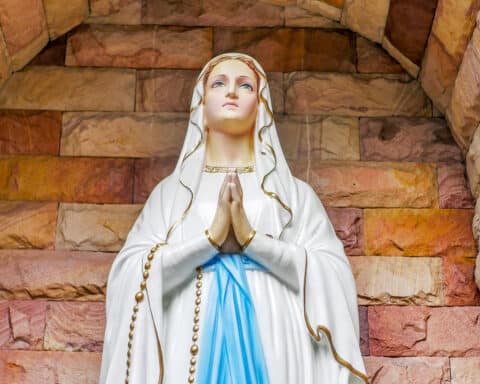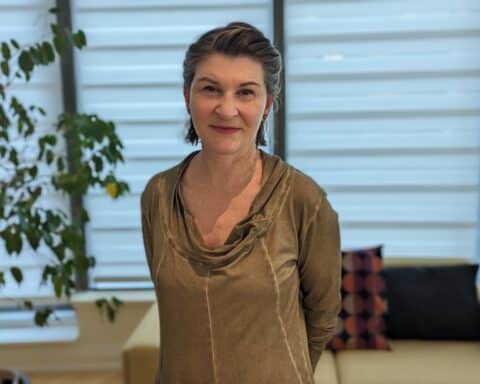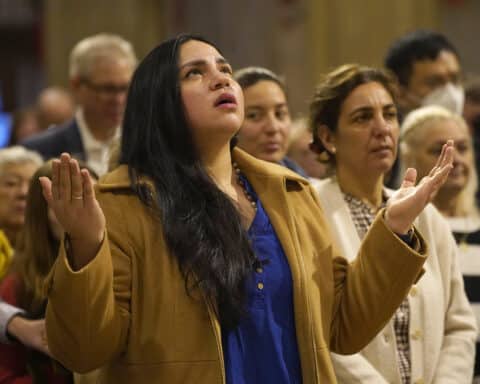Sherry Weddell’s book “Forming Intentional Disciples” (OSV, $16.95) is, I think, one of the most important Catholic books of this decade.
In it, she addresses the core issue facing the Church in our time: How to foster a culture in which all Catholics consciously see themselves as disciples of Jesus Christ living according to his will and as apostles sent into the world to proclaim him to others.
Weddell also outlines five stages of spiritual growth that typify the experience of conversion.
Conversion is, in the Church’s thinking, not simply for “converts” — i.e., non-Catholics joining the Catholic communion — but for everybody. In the Church’s thinking, not just Scott Hahn, G.K. Chesterton or Saul of Tarsus experienced conversion.
“Cradle Catholics” like Ignatius of Loyola, Francis of Assisi, Blaise Pascal and Teresa of Avila also had profound conversion experiences that transformed them. So must we.
Step 1: Initial trust
Where a person is able to have a positive association with Jesus Christ, the Church, a Christian believer or something identifiably Christian. Trust is not the same as active personal faith. Without some kind of bridge of trust in place, people will not move closer to God.
An example of initial trust is shown in the experience of a young garage-band pagan at the University of Washington in the late 1970s. He had almost no grasp of even the most basic aspects of the Gospel and had long ago learned the crucial truth of social life in the already heavily anti-Christian culture of Seattle: Christians are to be treated as social lepers. His perception of them was of fundamentalists obsessed with nutty “end times” theories, creationism and mysterious code words. His exposure to the Gospel consisted of a brief stab at reading Genesis and Revelation, coupled with some anti-Catholic Chick tracts, plus a few pious types he remembered from high school who might as well have spoken Greek for all the sense their lingo made to him. He knew essentially nothing about Christ and did not trust Christians.
I know this guy’s story because he is married to my wife. And when I was 20 years old, I went home for Thanksgiving break only to return to my dorm with a case of Martian Stomach Flu so virulent that I found the prospect of a quick death rather appealing for a day or two. In the midst of this, I received a phone call from a friend living on “the Christian floor” of my dorm. I mumbled something about my illness and hung up. About a half an hour later, there was a knock at my door and I heaved myself up from my bed of suffering, my face smeared with drool, and answered it. It was a young woman named Sandy MacKinnon, who I did not know from Eve, but who lived on the Christian floor. She said, “I heard you were sick. I brought you this” and brandished a bottle of Pepto-Bismol.
It’s been 35 years, but I have never forgotten that. With that one act of kindness to a stranger, done simply out of generosity, she won my trust. And eventually, by the integrity of their lives as Christians, the rest of the fellowship of Christians on her dorm floor did likewise. Lives lived in joy, generosity and integrity — not for show, but for the glory of Christ — can and do break down walls of distrust and give off a sweet aroma of beauty that people follow.
| Go Deeper |
|---|
 In her book “Forming Intentional Disciples,” Sherry Weddell writes that before Catholics evangelize others, they must first make a choice to know and follow Jesus themselves. Available at OSV.com, Weddell’s book is designed to help Catholics along that path to discipleship. In her book “Forming Intentional Disciples,” Sherry Weddell writes that before Catholics evangelize others, they must first make a choice to know and follow Jesus themselves. Available at OSV.com, Weddell’s book is designed to help Catholics along that path to discipleship. |
Step 2: Spiritual curiosity
When a person is intrigued by or desiring to know more about Jesus or some aspect of the Christian faith. This can range from mere awareness of a new possibility to something quite intense and proactive. Nevertheless, a person at the threshold of curiosity is not yet open to personal change. Curiosity is still essentially passive, but it’s more than mere trust.
The spiritually curious, often shyly and in fits and starts, find themselves drawn toward wanting to know more about Jesus, the Church, the Bible and the whole “Catholic thing.” This can be a protracted and complicated affair, as the Catholic Faith encompasses the whole universe, and the human person is massively complex and approaches the Faith from all over the map.
One thing to bear in mind is that such curiosity is not the same as spiritual seeking (that’s two steps down the road). It is, as yet, a passive approach. A person who is spiritually curious is interested in learning more.
He or she will not dismiss “God talk” but will not initiate such conversations. They will be quietly “taking it in.” They are intrigued and may find themselves surfing the Web furtively to explore something or other about Jesus or the Faith, or wondering about some theological question prompted by anything from a half-remembered Bible verse to a speculation prompted by a science-fiction story they saw on TV.
Interestingly, Jesus’ pedagogy with the spiritually curious is often the deeply Jewish method of answering questions with questions or with answers designed to provoke more questions. “Why do you call me good?” (Mk 10:18). “Who do you say that I am?” (Mt 16:15). “What do you want me to do for you?” (Mk 10:51). “Was John’s baptism of heavenly or of human origin?” (Lk 20:4). “Whose image is this and whose inscription” is on this coin (Mt 22:20)? All these questions and many more were asked by Jesus in order to force the curious more deeply into their curiosity. This is important for us, as it can be a temptation to accidently put out the small fire of newly kindled curiosity with a gallon of hasty, pre-processed answers. Sometimes it is better to let the curious work through things themselves for a while and make the answers their own.
In our own lives, it is good to cultivate an attitude of curiosity as well so that we can pass it on to others. Some have foolishly said, “What the mind doesn’t understand, it worships or fears.” The truth is not that simple. Typically, what the mind doesn’t understand it either ignores or wonders about. Those who cultivate spiritual curiosity in themselves and others are on a trajectory, not only to learn more about God, but about everything, because God is the author of everything. But they are not yet worshipping, for they are not yet acting as intentional disciples.
If they make the choice to follow their curiosity, then exploration, not fear and worship, is typically what happens next. Moses at the Burning Bush was not afraid or worshipful, but curious. Worship (and fear) only began when he learned who was there, not when he didn’t know who was there. In short, wonder is the common root of all art, philosophy, science — and religious experience.
But it is not the flower.
Step 3: Spiritual openness
The critical point when a person acknowledges to him or herself and to God that he or she is open to the possibility of personal and spiritual change. This is one of the most difficult transitions for a postmodern nonbeliever as it can feel dangerous, crazy and out of control. Openness is not a commitment to change. People who are open are simply admitting they are open to the possibility of change.
Here we are concerned with the most important form of curiosity: a desire to know more of God. And that desire will, if all goes well, lead to the crisis of spiritual openness.
I call it a crisis because spiritual openness is the stage in the spiritual journey that is most difficult for commitment-averse postmoderns to navigate because it represents the point in the journey where serious choices need to be made. It is the moment when it dawns on us that we are going to have to be active somehow, not merely passive — that God might not merely be an abstract “what” or a “why” we are studying with growing philosophical interest, but a “who” that is calling to us with incalculable demands and desperately beautiful promises. We realize, however dimly, that Jesus Christ and the Church that speaks to us of him may indeed require something of us.
That can be scary in a civilization that is consumer driven, that believes in keeping all its options perpetually open, that fears commitment to all relationships. Because of this jitteriness (and because we ourselves may share it even if we are cradle Catholics), some rules of thumb might be helpful both in helping others and in passing this threshold ourselves.
As we struggle to open ourselves to God’s will in Christ, we can practice nonjudgmental truthfulness, speaking plainly of the places in our own lives where we find the Gospel challenging. This was, after all, the method of the apostles, who give us a full accounting of their failures of nerve, their inability to understand and even their betrayals of Christ. We do this not with a view to finding excuses for ignoring the Gospel, nor with a view to cudgeling others who are struggling, but with a view to opening ourselves to the leading of Jesus and supporting one another in our struggles.
As mentors to people who are struggling with openness, we can help them connect the dots between their experience and the revelation of the Gospel. Because grace builds on nature, and it is Christ who chooses us first and not we him, there is always a way to arrive at the realization that God is not some remote, far-off object, but has already been at work in us and through us. He has already used us in some way for the good of others, or given us gifts, or helped us down the path we might only now realize we are on. Often, we can help others by using their own words, and connecting them with the Gospel will help them realize God is not a threat to our freedom, but the ground of it, and help them get past the fear of openness.
At this stage, it is often beneficial to frankly and openly encourage those struggling with openness to ask God for a sign to direct them, to encourage them to pray and profess to God their openness to pursuing him, and to encourage them to enter into a life of regular prayer both alone and together with others.
This might be a good time to invite them to Mass or to begin reading the Gospels together. Also, the inquiry phase of RCIA can be helpful here.
Step 4: Spiritual seeking
The threshold in which a person moves from being essentially passive to being one who actively seeks to know the God who is calling him or her. Seekers are asking, “Are you the one to whom I will give myself?” At this stage, the seeker is engaged in an urgent spiritual quest, seeking to know whether he or she can commit to Christ and his Church.
Once past this crisis of openness, people often find they are no longer able to simply wait for the tide of life to wash events to them. They become active spiritual seekers.
Weddell describes spiritual seekers as “dating with a purpose.” They are no longer merely passive participants in a relationship. And that relationship is not primarily with religion or theology or music or the Bible or a saint or Catholic aesthetics or liturgy or any other mere creature (though those things may well play a vital role and be inextricably bound up with the relationship). Rather, the core relationship is now with God revealed in the person of Jesus Christ. In short, the seeker is seeking Jesus, not a creature or an abstraction.
| Five Stages |
|---|
|
These five stages of growth in discipleship are not a law. It is not inevitable that one will pass through all five stages in neat succession, nor that one will pass through all the stages, nor that one will not regress or waffle between them, nor that one will not precociously leapfrog from trust to spiritual openness to intentional disci- pleship via some dramatic intuition or gift of the Holy Spirit. And, as many people sadly demonstrate, it is not a given that somebody will even reach the initial stage of trust due to factors ranging from personal trauma to the terrible witness a Christian may give to Christ.
|
If you are mentoring somebody who is a seeker, this is the perfect time for them to enter the catechumenate. If you are yourself a seeker who is undergoing a deeper conversion as a Catholic, this is a good time to undertake a closer study of the Faith, specifically with the goal of using the gifts and graces of the Church (especially the sacraments) in order to seek the guidance and the grace of the Holy Spirit.
Ask the Spirit to help you cultivate your gifts and offer them (and yourself) to Christ with greater and greater freedom. At the core of this stage of conversion is the experience of a soul that, like the psalmist “followeth hard after thee” (Ps 63:8) and can no longer be content with passivity or neutrality.
Intensified prayer, a fruitful pursuit of reading the classics of Christian spirituality and a sense of growing hunger for the sacraments can characterize this stage of pre-discipleship, as well as a desire to explore the ways in which the Faith is lived out in the works of mercy, different liturgical expressions and ways in which the virtues can be pursued.
Step 5: Intentional discipleship
This is the decision to “drop one’s nets,” to make a conscious commitment to follow Jesus in the midst of his Church as an obedient disciple and to re-order one’s life accordingly.
The mention of “pre-discipleship” brings us to our last challenge: namely, the need to finally pass from exploration of Jesus and his Church to full and complete commitment. This is what Weddell calls the “dropping the net” moment. The image comes from the story of St. Peter dropping his nets, leaving behind his former life and livelihood, his social connections, his home and even his family and choosing to follow Jesus Christ wherever he went, come what may (cf. Lk 5:4-10). It is the single most important decision a person can possibly make (which is why Jesus calls us to count the cost). But it is the goal of the Christian life — all Christian lives, not just converts.
It can be as dramatic as St. Paul getting knocked off his horse or as unseen as a quiet resolve arrived at during a sleepy Sunday morning Mass. But however we arrive at it, that resolve to follow Jesus consciously and intentionally with our whole heart, soul, mind and strength is what the whole of the Christian call to discipleship is all about. Once made, that decision will henceforth be the controlling decision that will drive and coordinate everything — absolutely everything — in the life of the disciple of Jesus Christ and, as Paul says, “destroy arguments and every pretension raising itself against the knowledge of God, and take every thought captive in obedience to Christ” (2 Cor 10:5). Here begins the New Life.
| Biblical Background |
|---|
|
A look at the scriptural basis for the Five Stages of Spiritual Growth from Sherry Weddell’s “Forming Intentional Disciples”: Initial trust
In the parable of the sower (Mt 13:3-23), Jesus stresses the liberality of God’s grace. God, like the sower in ancient Near Eastern agriculture “broadcasts” his seed, flinging it far and wide and with no concern about focus-grouping or efficiency or target audiences. Some of the seed lands on good soil, some does not. As Jesus says, God “makes his sun rise on the bad and the good, and causes rain to fall on the just and the unjust” (Mt 5:45-46). Likewise, Jesus was indiscriminate in his willingness to associate with anybody — friend, foe, rich, poor, Jew, Gentile, man, woman, young, old. We are likewise called to be generous and consistent in love in the hope that in imitating Christ, we too will fling the seed of the word far and wide. Spiritual curiosity
The initial trust inspired by the encounter with Christians living lives of consistent and generous authenticity often leads one to spiritual curiosity. In a two-faced world where people so often make everything, including the things of God, a means for exploiting others, Christians of generosity and integrity can arouse profound curiosity. As Weddell says, “When we live lives that are inexplicable apart from the grace and power of the Gospel, we will often find that curiosity is sparked among people who were formerly hostile to the Faith. To be a witness does not consist in engaging propaganda, nor even in stirring people up, but in being a living mystery. It means to live in such a way that one’s life would not make sense if God did not exist.” We see this as the “initial trust” response of the crowds to Jesus’ preaching — “The people were astonished at his teaching, for he taught them as one having authority and not as the scribes” (Mk 1:22) — ripens into the spiritual curiosity: “Who then is this, who commands even the winds and the sea, and they obey him?” (Lk 8:25). Spiritual openness
To those who were spiritually open, Jesus is often very direct. The early disciples in John’s Gospel receive the essence of Jesus’ invitation: “Come, and you will see” (John 1:39). The paradox of Jesus’ call is that it is wide open to anybody, but minces no words about the fact that the Gospel to which we open ourselves is going to make profound demands upon us. We will be asked to love him more than father, mother, wife, husband, children, brothers, sisters and, indeed, our very lives (Lk 14:26). He warns us to “calculate the cost” (Lk 14:28), to beware of letting the cares of this world choke the seed of the word (cf. Mt 13:22), to not put our hand to the plow and look back (cf. Lk 9:62). To the mere dilettante rich young man, he issues the challenge to sell all he has, give to the poor and then follow him (cf. Mt 19:16-30). Again and again, Jesus pays the spiritually open person the supreme compliment of being absolutely straight with him about the fact that the life of a disciple of Christ will require everything of him or her. And the response is, as history demonstrates, volcanic. Nobody is ever bored by Jesus — galvanized, thrilled, passionately devoted, repelled, terrified, offended, but never bored. The real call to Christian discipleship always has that effect. Spiritual seeking
The great watchword of the spiritual seeker is summed up in Christ’s great instruction, “Seek first the kingdom (of God) and his righteousness, and all these things will be given you” (Mt 6:33). The seeker is abandoning the false notion that God stands in the way of freedom and happiness, and realizing that God is the good he or she has sought all his life in his pursuit of the shadows and copies of beauty that are mere earthly beauties. He or she is turning away from idols and coming to see the goods of this world as sacramentals pointing to God, not as ends in themselves. Like John the Baptist, he is asking “Are you the one who is to come, or shall we look for another?” (Lk 7:20). And he now is expecting an answer from God. Intentional discipleship
The intentional disciple has made a searching and deliberate act of the will to follow Jesus. It is as far from passivity, indifference, cultural Catholicism or vague and formless pop “spirituality” as you can get. The intentional disciple is now actively cultivating the habit of subordinating all his needs, wants, desires, plans and earthly loves to the God who is love, incarnate, crucified and risen in the person of Jesus Christ. Like Thomas, confronted with the risen Christ, his response is “My Lord and my God!” (Jn 20:28). Like the disciples on the Emmaus road, the intentional disciple’s heart burns within him (cf. Lk 24:32). Like Paul, the intentional disciple cries, “For the love of Christ impels us, once we have come to the conviction that one died for all; therefore, all have died. He indeed died for all, so that those who live might no longer live for themselves but for him who for their sake died and was raised” (2 Cor 5:14-15).
|





